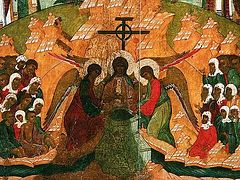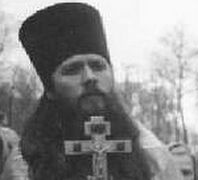Archpriest Artemy Vladimirov speaks on the spiritual meaning of the Dormition Fast, about how to spend it, and how to purely honor the Mother of God during these days, with whom Rus’ has always had a special relationship.
What distinguishes the autumnal season in Russia from, let’s say, a Canadian autumn? Those who have been in the New World know how bright it is there with its fiery colors. Those who have been in the New World know what flashes can be seen on Lake Ontario in August. Those who have seen Canadian maples like glowing tongues of flame can hardly forget this beauty. And yet, those who left the borders of our motherland behind long ago are always drawn to Russia, whose autumn is unforgettable in its lyricism and quietness, or, as Theodore Ivanovich Tyutchev said, the modesty of its withering nature. So, what is the difference between Russian autumn and Australian or European autumns? It’s that our people, naturally God-loving to this day, at times pious, especially venerate the Mother of God, and penetrate into the Kingdom of Heaven with a special sense of devotion, veneration, and gratitude. It is precisely to her that our people dedicate the middle of August—I am thinking now of the royal calendar, when on August 15 (now the 28th, that is, at the end of the month) we celebrate the autumnal Pascha—as the day of the blessed repose of the Theotokos Mary has been called by us from time immemorial—her Dormition, her passing beyond the bounds of the earthly existence of her all-pure, immaculate soul.
When you find yourself in the bosom of untouched nature or even in a city park somewhere in August, you cast your eyes upon the afterglow of the maples: golden and green-red leaves slowly falling and silently lying underfoot; you hear somewhere off in the villages, “kurli, kurli, kurli”—a formation of cranes or another migratory bird flying to warmer countries. And if you get up in the morning and you see how clusters of fog swirl, rising from little rivers and lakes, and it seems, even in the absence of artistic imagination, that this fog, creeping along the flooded meadows or the covering of leaves, carpeting the Pushkin alleys there in Mikhalovoskoe,[1] is truly a covering along which the Queen of Heaven silently walks in light steps in these Dormition days, wafting and breathing into our hearts an especial silence, peace, and blessedness, when you believe and weep and everything feels light, and you don’t want to think about anything vain, earthly, and low… Our people have already given up interest in the exchange rate of the dollar. We know that the price of oil will rise without us—the Saudis are not their own enemies—but we don’t want to think about the malice of the day—about the European Union, which is tearing apart like Trishkа’s caftan,[2] disintegrating into constituent parts—in these bright Dormition days.
The Dormition Fast, as you know or, perhaps, want to know, consists of two weeks and begins from a fixed date—August 14 according to the new style, and ends, accordingly, on August 28, on the day of the Dormition—the blessed repose—of the Most Holy Virgin Mary. The Heavenly Queen lived her entire life temperately. Imposing nothing on anyone, she, of course, avoided every kind of pleasure: She was interested neither in biscuits nor in rolls, because from a young age she fed on Heavenly bread brought to her not by human, but by angelic hands. The Mother of God had, through her light, air, food, and drink, the dew-bearing, vivifying grace of the Holy Spirit, which was poured out into her virgin and immaculate heart by fervent faith in the Heavenly Father and in the incarnate Son of God—the very One Whom she bore under her heart as human, and to whom she painlessly and miraculously gave birth without damaging the font of her virginity, remaining the Unwedded Bride, impartial to carnality, sweet things, corruption, and suffering; and Whom she bore in her hands, feeding with her virgin breasts, being the most humble, most meek, most God-loving servant of our Savior.
So, we, wanting at least to some small degree to bring our thoughts and feelings as a gift, always willing to greet the middle of August—the 14th—and embark upon the golden autumn season with the intention—having forgotten for a short time about beef steaks and rump steaks—of spreading the wings folded behind our backs and flying along the mountains and dales behind the cranes, with a bird’s eye view on our tiny human life with its city hustle and bustle, and then raising our eyes to her who gazes upon us from her icons of Kazan, Tikhvin, Vladimir—being the embodiment of purity, beauty, and love.
How should we spend the Dormition Fast? Of course, it’s wonderful to abstain from meat and dairy. Zealots, wishing to fulfill the fasting regulations to the letter, having suitable health for it, eat fish only in the middle of the fast on the Transfiguration. But the inner, substantive side of the fast is immeasurably higher and deeper, and we do not need to surprise any yogi-octopi,[3] or rawatarians, or anthroposophists—we do not want to talk about them at all—with any measure of abstinence, but that which the poor pagans do not have is given to us by the grace of God. To us is given to believe in the God-Man the Lord Jesus Christ and to honor by word, deed, mind, and heart his Most Pure Mother, who incomprehensibly combined motherhood and virginity; who, having born Christ in the Holy Spirit is also our mother, teacher, and mentor, who ever sees and hears us and hearkens to us, and ever intercedes for us before the throne of her Divine Son, receiving every one of our prayerful sighs, wiping away every tear that rolls down the cheeks of an orphan or widow, miraculously helping, sometimes through other people, everyone who in simplicity of heart and meekness calls upon the Theotokos.
In this respect, Russian Orthodoxy truly has its insignificant but internal differences from the life of Serbs, or Bulgarians, or Greeks. Yes, of course, we are all children of the Most Holy Theotokos, but study the lives of the Russian saints: St. Sergius, St. Seraphim of Sarov, Righteous John of Kronstadt—they all had a spiritual connection with the Queen of Heaven, served her in the spirit, waited on her as novices, having chosen her as their intercessor before the throne of the Most Holy Trinity. By this, I do not at all want to say that the saints of the Greek Church did not have a similar spiritual experience—undoubtedly they did. Read at least the lives of the Athonite saints—Peter the Athonite, for example, was guided by the Queen of Heaven. But, comparing the Greek and Russian iconographic traditions, gazing upon the frescoes of Theophanes the Greek and St. Andrei Rublev, you cannot but see a definite difference: the abundance of soft and light tones, and the ascetical, but above all, joyous spirit.
The particularity of Russian piety is its childlike commitment and devotion to the Heavenly Queen, united with the understanding of the fullness of its powerlessness and weakness, but at the same time, joyful confidence that she, the Most Holy Virgin, will never leave her little child, her suckling, her toddler, her child, but will always raise and protect from harm and comfort and take tender care of it. And the very face of St. Seraphim—a servant, the humble novice of the Queen of Heaven—with his Paschal smile, which shone upon all of Russia all year round in Sarov, and his greeting: “Christ is Risen, my joy!”—is a sacred, but at the same time quite tangible evidence of the closeness of spirit of this beloved of God to the Queen of Heaven. She, by the way, often appeared to St. Seraphim and once, when he was a youth, said of him, “This is one of our kind.” Let us recall also St. Sergius, whose life was crowned with the wondrous appearance of the Theotokos, who pointed at him with her finger with the words, “My beloved, you will soon be with us.”
How can we note our burgeoning love for the Queen of Heaven during these brief and quickly fleeting days of the Dormition Fast? The best expression of this love is the rule of the Theotokos, of which St. Seraphim reminded the Russian people in the first third of the nineteenth century. He confirmed with his oral testimony that the desire of Christians to bring the Virgin Mary the archangel’s greeting has never faded away in the universal Church throughout all the preceding centuries. It consists of 150 short, attentive, and unhurried prayers, when the words ring out in the hearts and mouths of Christians: “Rejoice, Virgin Theotokos. Mary, full of grace, the Lord is with thee. Blessed art thou among women, and blessed is the Fruit of thy womb, for thou hast born the Savior of our souls.” Mikhaill Yurievich Lermontov reminds us of this prayer in his beautiful poem:
In life’s hard, trying moments,
With sorrow in my breast,
I breathe a prayer most wonderful,
Which ever brings me rest.[4]
Is he not speaking of the special grace-filled power that permeates the words of this prayer? And in the twentieth century, not long before his martyric end, Hieromartyr Seraphim (Zvezdinsky), the bishop of Dmitrov, wrote to his spiritual children from exile, from somewhere in the Turukhan Region: “My children! If you only knew how happy I am amidst adversities, deprivations, and persecutions! Because, accustomed to daily turning to the Heavenly Queen with the archangelic greeting, ‘Rejoice, Virgin Theotokos!,’ I am aware, with fear and trembling, that whatever my earthly desires—whether I want to go fishing or rest a little on my path of misfortune (and he marched through the convoys of misfortune—Fr. A. V.)—God would give me, by the intercessions of the Virgin Mary, much more than I asked and more than I hoped for.”
Thus, my dears, if we want these two weeks to be like a fairy tale, poetic, and joyful; if we want to get out of the insular vicious cycle of depressive states of our own irritability, indefatigable idle talk, and proud thoughts; if we have grown tired of some unchaste thoughts, of corresponding base sensations that threaten to steal from our hearts the lily of purity and chastity, let us arm ourselves with this prayer—“Rejoice, Virgin Theotokos!” Perhaps not everyone can manage to say it 150 times in a day, but why not try fifteen? However, it should be done with feeling, with sense, with punctuation, and most importantly—with living faith that in the moment that we pronounce this prayer, we are standing before the Queen of Heaven.
She looks upon us with her maternal, and joyous, and somewhat sorrowful gaze. It is joyous because it is pleasing to her that we, her children, remember her, the Virgin Mary, that we stretch out our hands to her, seeking her protection. It is sorrowful because she knows our frivolity: As soon as we get what we want, we relax, we become gloomy, and we again fall into some kind of insensibility and we return to our soul-hating sins. Nevertheless, one Athonite monk, aware of his complete unworthiness after another relapse into a certain sin incompatible with the title of monastic, turning to the Theotokos, pronounced these words: “I am a swine, but thine, O Mother of God! Reject not me, thy impure and sinful servant!” And imagine, she didn’t reject him! Thus, it’s not in vain that the Russian people testify that everyone who calls upon the name of the Most Holy Theotokos with faith and repentance receives her help. Even if he limits himself to a mental cry: “Most Holy Theotokos, save, help, and cleanse me! Help me out of the swamp, out of the quagmire I’m in! Strengthen me, guide my feet on the path of the commandments of God, that I would pass the remaining days of the Dormition Fast in purity and honesty, faith and fidelity! Grant that I might meet the day of your Dormition clean from every impurity of flesh and spirit!”
And, of course my dears, we especially please the Mother of God if we resort as soon as possible to a serious, deep confession, and, having been purified of the thorns wounding us, having removed from our hearts the splinters of sins by confession, proceed to the holy chalice, not forgetting that when we partake of the All-Pure Body and Blood of the Savior, we receive them from the hands of the Theotokos—after all, it was she that gave body and blood to the incarnate God. Thus, becoming of one Body with the Lord in the Holy Eucharist, we become at the same time children of the Most Holy Theotokos in the Holy Spirit. And I very much believe that this Dormition Fast will bring all of us relief, purification, and inspiration.






